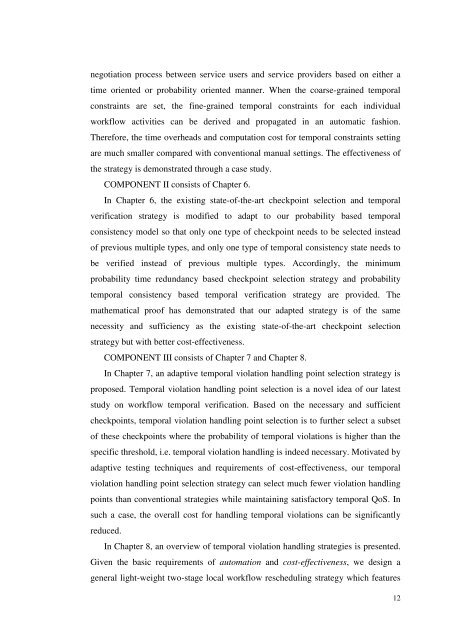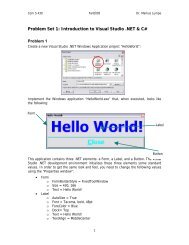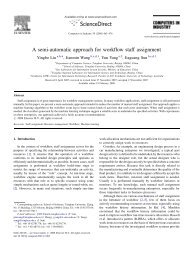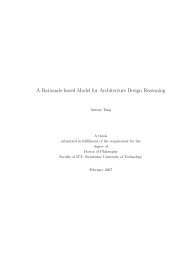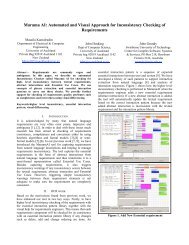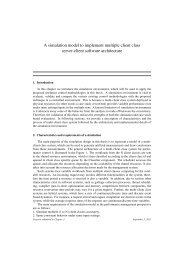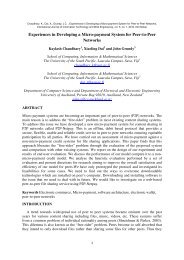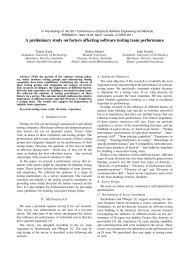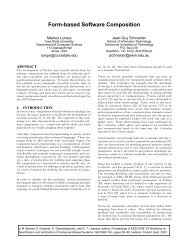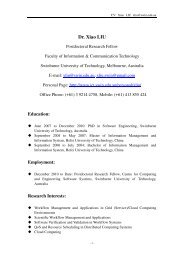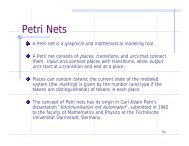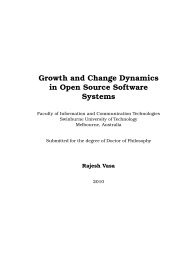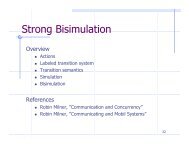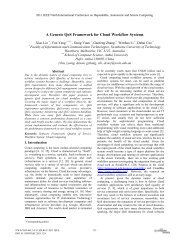Xiao Liu PhD Thesis.pdf - Faculty of Information and Communication ...
Xiao Liu PhD Thesis.pdf - Faculty of Information and Communication ...
Xiao Liu PhD Thesis.pdf - Faculty of Information and Communication ...
You also want an ePaper? Increase the reach of your titles
YUMPU automatically turns print PDFs into web optimized ePapers that Google loves.
negotiation process between service users <strong>and</strong> service providers based on either a<br />
time oriented or probability oriented manner. When the coarse-grained temporal<br />
constraints are set, the fine-grained temporal constraints for each individual<br />
workflow activities can be derived <strong>and</strong> propagated in an automatic fashion.<br />
Therefore, the time overheads <strong>and</strong> computation cost for temporal constraints setting<br />
are much smaller compared with conventional manual settings. The effectiveness <strong>of</strong><br />
the strategy is demonstrated through a case study.<br />
COMPONENT II consists <strong>of</strong> Chapter 6.<br />
In Chapter 6, the existing state-<strong>of</strong>-the-art checkpoint selection <strong>and</strong> temporal<br />
verification strategy is modified to adapt to our probability based temporal<br />
consistency model so that only one type <strong>of</strong> checkpoint needs to be selected instead<br />
<strong>of</strong> previous multiple types, <strong>and</strong> only one type <strong>of</strong> temporal consistency state needs to<br />
be verified instead <strong>of</strong> previous multiple types. Accordingly, the minimum<br />
probability time redundancy based checkpoint selection strategy <strong>and</strong> probability<br />
temporal consistency based temporal verification strategy are provided. The<br />
mathematical pro<strong>of</strong> has demonstrated that our adapted strategy is <strong>of</strong> the same<br />
necessity <strong>and</strong> sufficiency as the existing state-<strong>of</strong>-the-art checkpoint selection<br />
strategy but with better cost-effectiveness.<br />
COMPONENT III consists <strong>of</strong> Chapter 7 <strong>and</strong> Chapter 8.<br />
In Chapter 7, an adaptive temporal violation h<strong>and</strong>ling point selection strategy is<br />
proposed. Temporal violation h<strong>and</strong>ling point selection is a novel idea <strong>of</strong> our latest<br />
study on workflow temporal verification. Based on the necessary <strong>and</strong> sufficient<br />
checkpoints, temporal violation h<strong>and</strong>ling point selection is to further select a subset<br />
<strong>of</strong> these checkpoints where the probability <strong>of</strong> temporal violations is higher than the<br />
specific threshold, i.e. temporal violation h<strong>and</strong>ling is indeed necessary. Motivated by<br />
adaptive testing techniques <strong>and</strong> requirements <strong>of</strong> cost-effectiveness, our temporal<br />
violation h<strong>and</strong>ling point selection strategy can select much fewer violation h<strong>and</strong>ling<br />
points than conventional strategies while maintaining satisfactory temporal QoS. In<br />
such a case, the overall cost for h<strong>and</strong>ling temporal violations can be significantly<br />
reduced.<br />
In Chapter 8, an overview <strong>of</strong> temporal violation h<strong>and</strong>ling strategies is presented.<br />
Given the basic requirements <strong>of</strong> automation <strong>and</strong> cost-effectiveness, we design a<br />
general light-weight two-stage local workflow rescheduling strategy which features<br />
12


